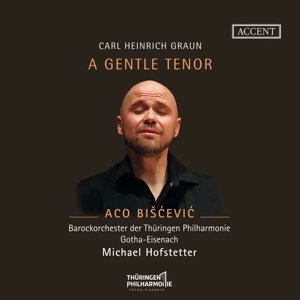
Carl Heinrich Graun (1704-1759)
A Gentle Tenor
Cantata Superba un dì la rosa
Cantata Agitata alma mia
Cantata In quel amena valle
Aco Bišćević (haute-contre), Barockorchester der Thüringen Philharmonie Gotha-Eisenach/ Michael Hofstetter
rec. 2023, Kulturhaus, Gotha, Germany
Italian texts with English translations enclosed
Reviewed as WAV download
Accent ACC24404 [56]
Carl Heinrich Graun is today a marginal composer in the history of music, but in his time he was considered to be, together with Johann Adolph Hasse, the most important German composer of Italian operas. Today his operas are rarely heard, but at least Montezuma (1756) has appeared in the record catalogues, most famously in the shape of a highlights disc from 1966, conducted by Richard Bonynge, with his wife Joan Sutherland in one of the leading roles. Besides his composing (and he was certainly industrious, with more than thirty stage works to his credit) he was a prominent singer. Frederik the Great of Prussia, who was his employer for many years, reportedly said, when he learnt of his demise: “We shall never hear such a singer again!” He was obviously a virtuoso, and Johann Adam Hiller described him thus: “His voice was not particularly strong, but very pleasant; it was a high tenor. He had great ease and sang passages with great skill and clarity in the right style […]. But he also performed the runs in the adagios excellently. He sang them very tenderly and movingly”. I imagine that Aco Bišćević’s singing on the present disc gives a good picture of what he must have sounded like in his heyday.
Besides operas, Graun composed a lot of other vocal music, both sacred and profane. A passion cantata, Der Tod des Jesu, and a Te Deum, have been recorded, the former several times, and both are established as classic of the North and Central German musical culture. His 38 Italian cantatas, of which three are recorded here, are profane, and in many ways reflect his opera style with dramatic recitatives and expressive arias. There are several other works ascribed to Graun, but their authenticity is uncertain. Some may have been written by his elder brother Johann Gotlieb, who was a professional violinist but also composed occasionally. Most of the cantatas were undoubtedly written with Carl Heinrich’s voice in mind, and should therefore be representative for his capacity, if King Frederick’s and Hiller’s judgements can be trusted. Hiller’s statement, quoted above, could word for word have been written by me after listening to Aco Bišćevićv- and that is a compliment.
Structurally the cantatas follow a strict pattern: a recitative, followed by an aria, a second recitative, and a final aria. The arias are invariably of the da capo type with often quite excessive adornments in the reprise. They vary in length. The beautiful Christallina e limpida onda (track 10) in the pastoral cantata In quel amena valle exceeds twelve minutes, and the even more beautiful Ahi che crudel martire (track 6) from the cantata Agitata alma mia is not far behind with a playing time of 9:30. I urge curious readers to sample this track first – it is a candidate for the ever growing favourite list! The recitatives are fairly short, but very expressive and formulae-free. Here is a true dramatist is at work.
Carl Heinrich Graun was not a pioneer and innovator, but a highly competent traditionalist who kept his heritage up-to-date. It is valuable contribution to music research to lift this attractive music out of oblivion and make it available to a wider public – not least because it is performed so mouthwatering – and it is not only the marvellous singing of Aco Bišćević that makes this issue so attractive, but also the stirring playing of the Barockorchester der Thüringen Philharmonie Gotha-Eisenach under the inspired direction of Michael Hofstetter.
Göran Forsling
Footnote
Haute-contre is a natural tenor with high tessitura. The voice is not be confused with a counter-tenor: (mostly) a baritone who sings in falsetto and sounds like a mezzo-soprano.
Buying this recording via a link below generates revenue for MWI, which helps the site remain free.




















